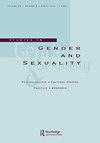向前迈进:让处于性别转换中的伴侣在关系中发声
Q3 Social Sciences
引用次数: 0
摘要
摘要:处于转型期的伴侣如何理解他们的关系历史可能被抹去的可能性,同时作为一对完整的伴侣来拥抱他们的未来?这篇文章承认,许多伴侣在变性和/或非二元伴侣转变时所经历的现实,这往往会引发失落感和可能的悲伤。根据Kübler Ross和Kessler的《悲伤与悲伤》一书,伴侣通过克服悲伤,学会治愈过去的损失,接受未知的未来。这篇文章还着重于分享对伴侣旅程的见解。这些知识可以帮助心理健康专业人员支持他们的客户,帮助他们度过转型期伴侣在建立成功关系时面临的各种挑战。所提供的材料和建议来源于顺性别伙伴的一对一访谈和书面答复以及多种族和性别多样人群参加研讨会的情况。合作伙伴交流了他们的个人经历,希望为变性人群服务的临床医生提供更多信息。这篇文章为治疗师和学术学者提供了一个机会,通过伴侣的视角来看待这种转变。11提交人声称保留其所有出版和未出版材料的所有版权。第1.15页。本文章由计算机程序翻译,如有差异,请以英文原文为准。
Moving Forward: Giving Voice to Partners in a Relationship With Those in Gender Transition
ABSTRACT How do partners of those in transition make sense of the possibility that their relationship history may become erased, while racing to embrace their future as an intact couple? This article acknowledges the realities many partners experience as their transgender and/or nonbinary partner transitions, which often evokes feelings of loss and possible grief. By navigating grief, based on Kübler-Ross and Kessler’s book On Grief and Grieving, partners learn to heal the loss of their past and accept their unknown future. The article also focuses on sharing insights into the partner’s journey. This knowledge can help mental health professionals support their clients through the various challenges facing some partners of those in transition as they embark on a successful relationship. The material presented and the recommendations offered are derived from the input of one-to-one interviews and written responses of cisgender partners and workshop participation by multiracial and gender-diverse populations. Partners communicated their personal experiences in hopes of providing additional information to clinicians who serve the transgender population. This article affords an opportunity for therapists and academic scholars to view the transition through the lens of the partner. 1 1 The author claims reservation of all copyrights to all her published and unpublished material. APA 1.15.
求助全文
通过发布文献求助,成功后即可免费获取论文全文。
去求助
来源期刊

Studies in Gender and Sexuality
Social Sciences-Gender Studies
CiteScore
0.80
自引率
0.00%
发文量
15
期刊介绍:
Beginning in the final two decades of the 20th century, the study of gender and sexuality has been revived from a variety of directions: the traditions of feminist scholarship, postclassical and postmodern psychoanalytic theory, developmental research, and cultural studies have all contributed to renewed fascination with those powerfully formative aspects of subjectivity that fall within the rubric of "gender" and "sexuality." Clinicians, for their part, have returned to gender and sexuality with heightened sensitivity to the role of these constructs in the treatment situation, including the richly variegated ways in which assumptions about gender and sexuality enter into our understandings of "normality" and "pathology."
 求助内容:
求助内容: 应助结果提醒方式:
应助结果提醒方式:


